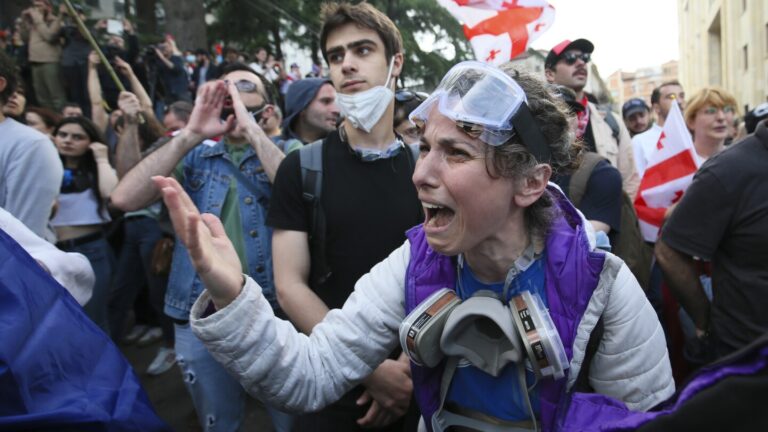TBILISI, Georgia (AP) — The speaker of Georgia’s parliament said Monday he has signed a much-anticipated bill. Weeks of protests Critics say the bill would restrict media freedom and jeopardize the country’s chances of joining the European Union.
Speaker Shalva Papuashvili acted after parliament, controlled by the ruling Georgian Dream party, overturned a veto of the bill. President Salome Zourabichvili.
Approved by lawmakers last month, countermeasure Media, non-governmental organizations and other non-profit organisations are now required to register as organisations “serving the interests of foreign powers” if they receive more than 20% of their funding from overseas.
Zurabishvili’s conflicts deepen The ruling partyopposed the bill, accusing the party of endangering Georgia’s future and “blocking its path to becoming a full member of the free and democratic world.”
Gia Nodia, a Tbilisi-based political analyst, said the new law marked a “turning point” for Georgia.
“It’s taking the country away from democracy and towards authoritarianism,” he said.
The government says the law is necessary to stop harmful foreign forces it sees as trying to destabilize the South Caucasus country of 3.7 million people. Many journalists and activists say its real purpose is to stigmatize them and limit debate ahead of parliamentary elections due in October.
“This law will thwart and destroy Georgia’s future, its future in the European Union and the North Atlantic[Treaty]Organization,” said journalist Keti Tutberidze.
Opponents have denounced the law as “Russian law,” saying it resembles measures the Kremlin has pushed through to crack down on independent media, nonprofits and activists. They say the measures may have been pushed by Moscow to thwart potential further integration of Georgia with the West.
Zurab Japaridze, leader of the Girch More Freedom opposition party, said the aim of the law was to “cleanse the country of the non-governmental sector, critical media and opposition parties and show us the realities of Russia.”
Prime Minister Irakli Kobakhidze dismissed the criticism as “unnecessary emotions that have only artificial basis.”
“Only those with ill will towards our country have been defeated,” he said, adding that “the law has already been implemented and we all must act practically with a cool head, setting aside unnecessary emotions.”
The opposition United National Movement said masked assailants attacked its headquarters in Tbilisi over the weekend, smashing windows and damaging the building. The movement said the attackers were linked to the ruling party. The Interior Ministry has launched an investigation into the damage to the building.
The bill is nearly identical to one that the ruling party was forced to withdraw after massive street protests last year. The passage of the new bill has sparked renewed protests in Georgia, with protesters clashing with police, who have used tear gas and water cannons to disperse demonstrators.
After signing the bill, President Papuashvili reaffirmed that its main goal is to “increase the resistance of Georgia’s political, economic and social systems to external interference.”
“If non-governmental organizations and media outlets receive funding from foreign governments and want to participate in decision-making processes and influence the lives of Georgian people, they must meet minimum standards of transparency. Citizens need to know who is behind each actor,” he said.
Papuashvili said the justice ministry would have 60 days to complete the necessary procedures once the new law is published on Tuesday, after which those affected by the law would have to register and declare their financial situation for the past year.
The Georgian non-governmental organization Civil Society Foundation said on Thursday: Challenge the law In the Constitutional Court of Georgia.
The European Union’s foreign policy arm said the adoption of the law would “negatively affect Georgia’s progress on its path to EU membership.”
The EU granted Georgia candidate status in December and made clear that Tbilisi needed to implement key policy recommendations in order to move forward with its membership application.
After the bill was passed last month, US Secretary of State Antony Blinken announced travel sanctions against officials “responsible for or complicit in undermining democracy in Georgia.” Blinken said he expected the Georgian government to reverse course and “take steps to advance Georgia’s democracy and Euro-Atlantic vision.”
The United National Movement says the law is part of an effort by Georgian Dream, founded by billionaire former prime minister Bidzina Ivanishvili, to pull the country into Russia’s sphere of influence, a charge the ruling party vehemently denies.
Relations between the two countries have often been uneasy since Georgia gained independence after the collapse of the Soviet Union in 1991.
In 2008, Russia fought a brief war with Georgia in an unsuccessful attempt to retake the separatist region of South Ossetia. Moscow then recognized South Ossetia and another separatist region, Abkhazia, as independent states and strengthened its military presence in the region, which most of the world considers to be part of Georgia.
Tbilisi has severed diplomatic ties with Moscow, and although relations between Russia and Georgia have improved in recent years, its regional status remains a major source of worry.

